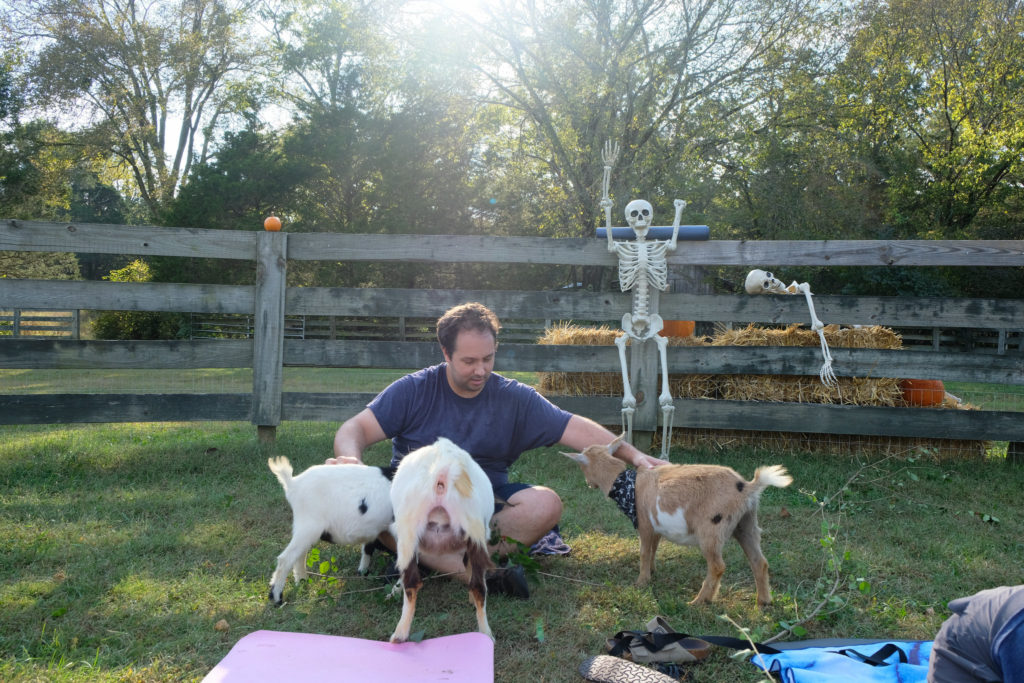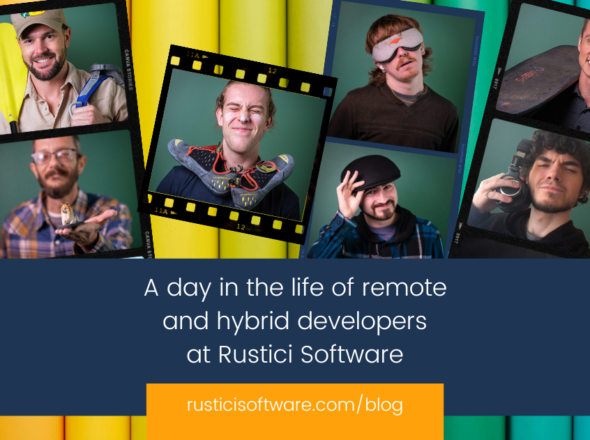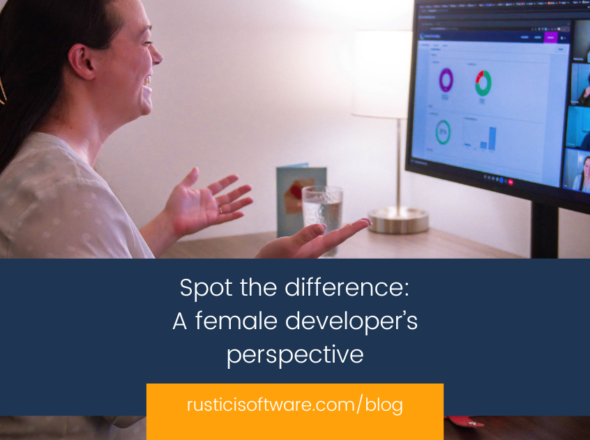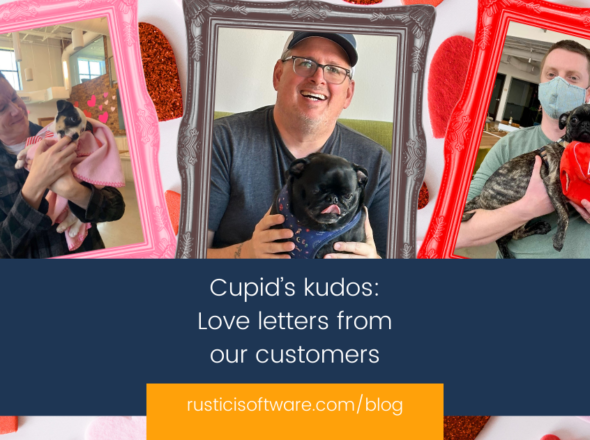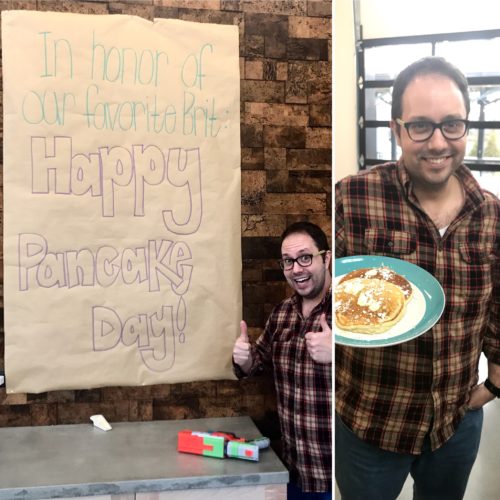
We thought it would be fun and interesting to spotlight some Rusticians and present you an interview-style conversation about what it’s like to work at Rustici Software. We started with Joe Donnelly earlier this year, who is someone that we fondly like to refer to as a Rustici Old Timer. If you missed it, you can catch up with Joe here. Today, I’m giving you a look at my conversation with Sam Cayford, who is a “newer” Rustician. Let’s see what Sam has to say…
Hannah: To start, tell me, how long have you been here?
Sam: A little bit over a year now.
H: What can you tell me about your role and background?
S: I’m a Software Developer, so predominantly I’m writing code, writing and fixing tests, all sorts of things related to software development, really.
H: How would you describe the people that work here?
S: In one word?
H: In however many words you need!
S: Well, first of all, I’d say that everyone is pretty much a normal person, which is *chuckles* not how my previous job experience—experiences—would have lead me to believe would be the case, especially working as a software developer, where you get a lot of sort of really quiet or reclusive type people or slightly a little bit weird or shy…. Everyone here is pretty normal. But also—and a big difference—is that everyone here is immensely intelligent. Like, sometimes intimidatingly so. You’re like, ‘woah’.
H: How would you describe our culture and/or work environment?
S: I’d say it’s pretty relaxed, in that you can come and go—you know—any time of the day or week that you want. But there’s also the added bit that you need to get stuff done. Um, you can’t just sort of come and go, spend 40 hours here, and leave at the end of the week having done nothing because, while it hasn’t happened to me, I get a feeling someone would call you out on that pretty quickly. But other than that, you get a lot of flexibility in terms of if you got a delivery at home, or if you want to get something done out of the office at some point (*Editor’s note: if you don’t want to steal time away from the office for these sort of things, see: #Jenafits), you can do whatever you need to do… within reason, it’s pretty flexible.
H: What has been your most memorable Rustici moment to date?
S: Pancake Day!
H: Tell me more. What happened on Pancake Day?
S: Um, well, I arrived in first on Pancake Day, and I arrived to a big sign in the communal pong area saying ‘Happy Pancake Day!’, which was quite surprising, because I only recall mentioning it being Pancake Day once, and it wasn’t that soon previously. Um… so I was quite surprised anyone remembered, let alone bothered to do anything. Then, there was a little sign in my office as well with my name on it, which I’ve still got up, even though it’s not Pancake Day anymore. And at lunch, we had a pancake bar.
H: I think most of the people that read this will be Americans who think Pancake Day is made up (like some other Rusticians did!) So tell me what Pancake Day is.
S: In fact, I got accused by Andy of making Pancake Day up because I wanted pancakes and my wife wouldn’t make them at home. But, Pancake Day is what you call, some people here call it Fat Tuesday. It’s the day before Lent, where you eat a bunch of stuff before giving it all up. But it is a real day. And it goes back to a long time ago when you weren’t allowed to eat eggs and flour and milk during Lent, so you had to use it all up beforehand.
H: It is typically a pretty big deal in England?
S: Oh, everyone knows all about it and celebrates it there.
H: What surprised you about working here? Something that you didn’t expect or anticipate?
S: This is a pretty difficult one, because I read virtually all of the website, I think, before I came to start working here, so I knew pretty much what I thought I was getting into. I think the biggest shock was how clever people were. How intelligent people were. Talking to them… trying to learn from them. Especially the first… probably even up to a month or two [of being here], you’re just sort of in awe. Like, thinking, ‘what am I doing here?’, until you settle in a bit. But, yeah. I expected people to be good based on the website and having talked to a few people during my interviews, but, to get here and find out that everyone was like that was quite a surprise.
H: ‘Like that’ being…
S: Really intelligent, and good at their jobs. Motivated.
H: This kind of goes along with what you were saying a little bit, I think, but what does being excellent, or being remarkable, mean to you?
S: What have you figured out in your time here thus far? Well, yeah, being intelligent is one of them. But having said that, I think there are ways around that. You can be intelligent and not work hard. Or you can be less intelligent and work hard and come up with the same result in most cases. I think most people here work hard–no, I think all people here work hard. So it’s a good combination. You’ve got intelligent and hard-working people… I’ve gone off track. What was the question?
H: About being excellent. What does it mean?
S: *Laughs* Okay. So, on top of that, I think being available to other people. The stuff we do here, nobody could do it on their own. And nobody knows—despite the quality of people here—nobody knows everything. Not one person knows everything. So I think being available, whether that be on Slack or on video call (for people that don’t work in this office), or just being able to knock on anyone’s office door whenever you feel like it… other than when they’re on the phone, no one’s ever said, “No, come back later.” They’re always like, “Yeah, I’ll answer some questions for you right now.” Especially as a new person, that was really helpful. Because otherwise you’re stuck in your office on your own trying to learn all of this stuff. That would have been pretty tough.
H: What makes you proud to work here?
S: Probably just getting the job. Having seen people that work here. At first, and still a little bit sometimes, I’m like, “What am I doing here? Why did they hire me?” So yeah, I count getting the job, actually, as quite a big achievement.
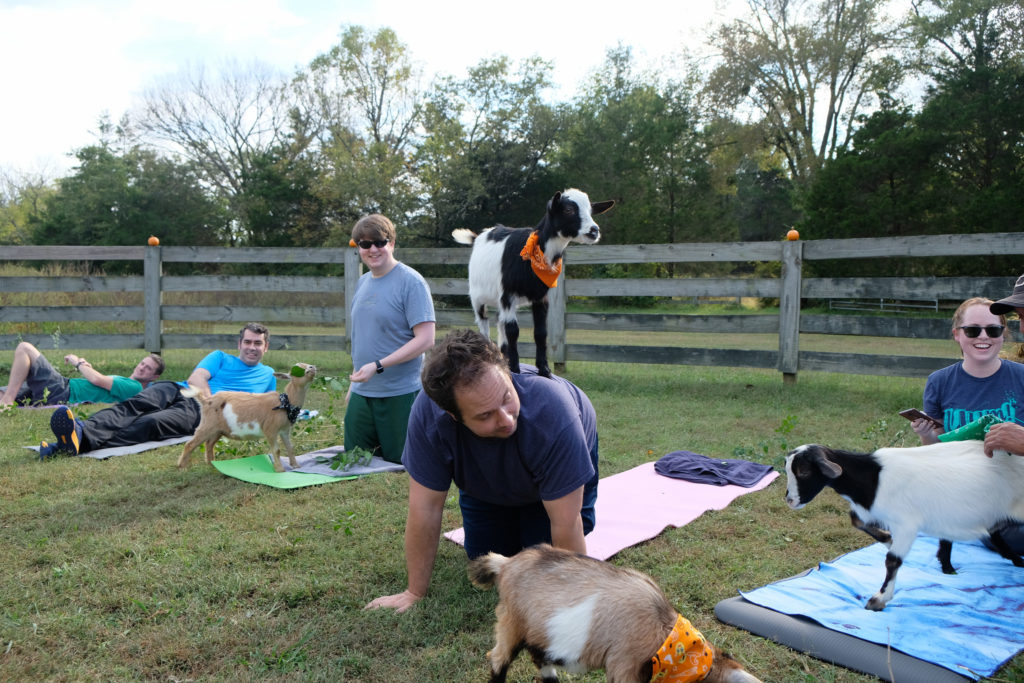
H: Would you say that risk-taking is encouraged here? What happens when people fail?
S: I wouldn’t say it was encouraged, but I wouldn’t say that it was discouraged, either. You know, if you were like—and I’ll go from a developer’s point of view—I’m going to change all of this code that’s really, really risky, just because I want to and I don’t like it, you know, I think people would be like, “Hang on a minute, don’t do that. Let’s talk through it.” But if there’s a reason to do it, a valid reason to do it and even if it’s a risky change or piece of work, it will still get done. I think people understand you have to weigh up the risk versus the reward.
In terms of when you fail, not a lot of failing goes on, to be honest, that I’ve seen. Typically you just own it, fix it, and get on with it. There doesn’t seem to be any sort of negative connotations towards the person that has failed. You might not have known, or, whoops!, that was a mistake. Learn from it. Move on.
H: What’s different about this place from anywhere else that you’ve worked?
S: Other than the fact that I sit in front of a computer and write code, virtually everything is different. Different office environment, different sort of feeling in the office, people want to hang out together even when it’s not work, the added activities that we do outside of work hours—or even inside of work hours—like Quell and the Christmas-y things…. The fact that people want to hang out together is not something that I had in my previous two jobs. It was sort of come in, be with these people for eight or nine hours, and then go home.
H: You mentioned there being a different feeling in the office. What is the feeling in the office?
S: There’s a lot of joking and fun that goes on. The work gets done, but there’s a lot of camaraderie between everyone that works here. There’s a lot of big personalities that keep things fun for the, perhaps, more quiet people like me. A little bit like me. I’m not quite the quietest person here.
H: Besides Pancake Day, what are some of your favorite activities that we’ve done?
S: My favorite was Thanksmas, but I’ve only done that once. Does it count?
H: Yeah! What did you get for Thanksmas?
S: I got a drone.
H: Have you used it?
S: Yeah. It is… it’s difficult! I took it out… well, first of all, I did it inside. *Laughs* I took if off inside, and this thing kicks off a lot of down force. So, when I did that, all that happened was it flew around but all it did was kick around all the dog fur into the air. I was like, “Oh, my God.”
H: Talk more about Thanksmas. What made it memorable to you?
S: What we did was what we would call a treasure hunt. I can’t remember… what did you call it here?
H: We called it a photo or video scavenger hunt.
S: No you didn’t! I would have known what that was. When it was being described…
H: Oh! We said it was like the Amazing Race.
S: Amazing Race. Yeah. ‘Cause I didn’t have a clue what that was. We don’t have Amazing Race in England, I’m guessing. Either that, or I’ve never seen it. But yeah, we went out and did a scavenger hunt, saw lots of crazy things outside. It was good to get to know a few people outside of the office environment. I was on a team with Ben, for example, who works in Pittsburgh (**Editor’s note: Ben actually lives in Boston. Not Pittsburgh), so, while I interact with him on a day-to-day basis for work, that was really sort of the first time we’d hung out outside of work. There were lots of games when we got back and prize and a food truck came. It was good.
I like Quells as well. I’ve been to a couple of Quells. I enjoy getting to do the activities. That’s probably everyone’s favorite. You also get to… one of the good things, and something that’s not been very prevalent in my prior jobs, is getting to sit in on meetings that aren’t in your area of expertise. Sitting in on finance-related meetings and company-wide ‘State of the Unions’ as you would call it in America. I hadn’t done anything like that in my previous jobs. It’s good to be able to know what everyone here does, basically, on a day-to-day basis, and how what they do affects the company. Whereas in previous jobs, I knew what the developers did, and I could go talk to other people, but I didn’t really know what they all did.
H: You are our office Brit! What are some funny stories about what that’s been like?
S: Other than not knowing what an Amazing Race was? There’s so many translation issues that you just wouldn’t think of. I’ve forgotten more than I’ll ever know. But one, I use the word ‘bung’ in front of Brian Rogers one time, which he thought was really funny. And I didn’t know what was funny.
H: What does it mean?
S: I used it as in like, a stopper. You know, like a stopper that you’d put in a test tube or something. Like a cork. And he said that wasn’t what it means here.
Outside of work, I made the fatal mistake of telling you that people mistake my name as Simon. And, I don’t know if you knew this, but Pfeiffer has taken to calling me Simon every morning now.
I’m not sure if everyone’s gotten used to it now, but it took me a couple of weeks to start to read the blank expressions on various people’s faces when I talk. Usually I can tell that they understand the first few words, and then the expression just disappears, and I’m like, ‘Oh, they don’t understand anything I’ve just said.’ And I think often a few people are too polite to say anything and just sort of nod along and go, “Yeah….”
H: *Laughing* Who do you think has the hardest time understanding you?
S: Um, you or TJ.
H: That’s all the questions I have. Is there anything else that you think would be helpful to share?
S: I’ve gotten better at pong! No, but really, I think working here as made me a better developer than I was a year ago. Other than the first year or two after I came out of university, I think working here for basically a year has made the biggest improvement in how good of a developer I am. So, yeah, if you come and work here, you’ll probably become better at your job.
Thanks, Sam!
